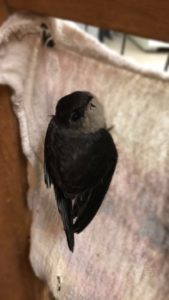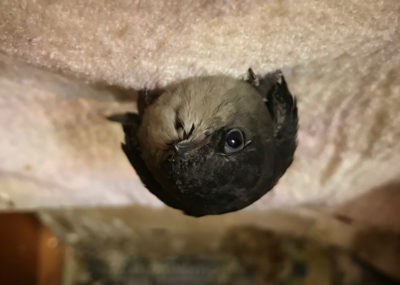Do you hear birds in your chimney? They’re probably a family of Chimney Swifts.

If you hear these birds in your chimney, it is best to let them be. The babies should fledge in a just a few weeks and then the family will leave.
If you’d rather not have avian visitors in your chimney next year, just put a cap on your chimney once the family has moved out. But Chimney swifts do have their benefits! They can eat thousands of mosquitoes in a single day!
Due to the declining use of chimneys, Chimney swift populations are shrinking. They are considered a Species of Greatest Conservation Need in DC and are listed as Near Threatened on the International Union for Conservation of Nature Red List.



This is a really useful information to a fairly critical problem. Getting them out without them being hurt is the real challenge.